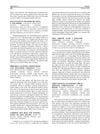 June 1995 in “Archives of Dermatology”
June 1995 in “Archives of Dermatology” A woman's hair loss was due to trichotillomania, which is often misdiagnosed and can require different treatments based on age and underlying conditions.
January 1994 in “Toxicological Sciences” Lower dosages of 2-(difluoromethyl)-dl-ornithine might reduce side effects, supporting further research.
December 2021 in “Journal of pharmaceutical research international” Trichoscopic features can help dermatologists distinguish between female pattern hair loss and chronic telogen effluvium.
 May 2012 in “Faculty Opinions – Post-Publication Peer Review of the Biomedical Literature”
May 2012 in “Faculty Opinions – Post-Publication Peer Review of the Biomedical Literature” A simple method using the wash test and dermatoscopy can help differentiate between two hair loss conditions, androgenetic alopecia and chronic telogen effluvium.
 January 2012 in “Yearbook of Dermatology and Dermatologic Surgery”
January 2012 in “Yearbook of Dermatology and Dermatologic Surgery” No significant difference in iron deficiency between women with or without hair loss.
 August 2006 in “Faculty Opinions – Post-Publication Peer Review of the Biomedical Literature”
August 2006 in “Faculty Opinions – Post-Publication Peer Review of the Biomedical Literature” A simple wash test can help differentiate between two types of hair loss, and dermatoscopy should be used for further clarification.
 June 2006 in “Faculty Opinions – Post-Publication Peer Review of the Biomedical Literature”
June 2006 in “Faculty Opinions – Post-Publication Peer Review of the Biomedical Literature” A simple method using the wash test and dermatoscopy can help differentiate between two hair loss conditions, androgenetic alopecia and chronic telogen effluvium.
 November 2005 in “NEJM Journal Watch”
November 2005 in “NEJM Journal Watch” Hair count is important to distinguish between genetic hair thinning (Androgenetic Alopecia) and hair thinning caused by disrupted hair growth (Chronic Telogen Effluvium).
 65 citations,
March 1999 in “Urology”
65 citations,
March 1999 in “Urology” Finasteride didn't significantly improve ICPPS symptoms, more research needed.
16 citations,
October 2013 in “Irish Veterinary Journal” Oral feline interferon-omega improved symptoms in diabetic cats with gingivostomatitis.
 5 citations,
January 2016 in “Asian pacific Journal of Tropical Biomedicine”
5 citations,
January 2016 in “Asian pacific Journal of Tropical Biomedicine” Phthirusa pyrifolia extract may lower testosterone and harm male rat reproduction without damaging the liver or kidneys.
 2 citations,
August 2022 in “Clinical Case Reports”
2 citations,
August 2022 in “Clinical Case Reports” A 17-year-old girl had severe, on-and-off hair loss, likely due to COVID-19. She was treated with Vitamin D3, biotin, and other supplements, and saw some improvement within a month.
 2 citations,
October 2000 in “The Journal of Urology”
2 citations,
October 2000 in “The Journal of Urology” Finasteride daily doesn't affect sperm production or semen in young men.
 May 2022 in “Authorea (Authorea)”
May 2022 in “Authorea (Authorea)” A 17-year-old girl has had repeated hair loss since childhood, which can be triggered by infections like COVID-19.

Diagnosing oral ulcers can be complex and requires careful examination and follow-up.
April 2014 in “The FASEB journal” The extract helps prevent hair loss and promotes hair growth in stressed mice.
 417 citations,
March 1991 in “American Journal of Psychiatry”
417 citations,
March 1991 in “American Journal of Psychiatry” Most adult chronic hair pullers are women who started in their early teens, often have other mental health issues, and may pull hair due to underlying psychiatric conditions.
110 citations,
April 2020 in “Advances in Wound Care” Nanotechnology shows promise for better chronic wound healing but needs more research.
 109 citations,
July 1984 in “Circulation”
109 citations,
July 1984 in “Circulation” Minoxidil helps heart function but doesn't improve exercise ability and may cause complications.
 71 citations,
November 2013 in “Clinics in Dermatology”
71 citations,
November 2013 in “Clinics in Dermatology” Acne is a chronic disease linked to various systemic conditions and has significant psychological and social effects.
 61 citations,
October 2010 in “Postgraduate Medical Journal”
61 citations,
October 2010 in “Postgraduate Medical Journal” Most patients with chronic kidney disease have skin problems, which get worse as the disease progresses, and dialysis doesn't greatly reduce these issues.
 59 citations,
March 2013 in “European Journal of Obstetrics & Gynecology and Reproductive Biology”
59 citations,
March 2013 in “European Journal of Obstetrics & Gynecology and Reproductive Biology” People with polycystic ovary syndrome have a higher chance of having chronic thyroiditis.
 59 citations,
April 2011 in “Retina-the Journal of Retinal and Vitreous Diseases”
59 citations,
April 2011 in “Retina-the Journal of Retinal and Vitreous Diseases” Finasteride may help treat chronic CSC, improving vision.
 57 citations,
December 2021 in “Advanced Functional Materials”
57 citations,
December 2021 in “Advanced Functional Materials” Wearable bioelectronics show promise for improving chronic wound care.
 54 citations,
October 2019 in “Cochrane library”
54 citations,
October 2019 in “Cochrane library” Some drugs may reduce prostatitis symptoms short-term with few side effects.
 50 citations,
May 2019 in “Drugs”
50 citations,
May 2019 in “Drugs” Cannabinoids may help treat chronic and chemotherapy-induced neuropathic pain, but more research is needed to confirm their effectiveness and safety.
 41 citations,
November 1993 in “Journal of The American Academy of Dermatology”
41 citations,
November 1993 in “Journal of The American Academy of Dermatology” DPCP helps treat severe hair loss, but 5% minoxidil doesn't add benefits.
 40 citations,
April 2013 in “Dermato-endocrinology”
40 citations,
April 2013 in “Dermato-endocrinology” People with chronic Alopecia Areata often have lower vitamin D levels.
 38 citations,
January 2016 in “Cell Death and Disease”
38 citations,
January 2016 in “Cell Death and Disease” The TCL1 transgenic mouse model is useful for understanding human B-cell leukemia and testing new treatments.
 30 citations,
August 2016 in “Advances in radiation oncology”
30 citations,
August 2016 in “Advances in radiation oncology” Researchers developed a mouse model that successfully mimics the bladder damage seen in humans after radiation therapy.

























